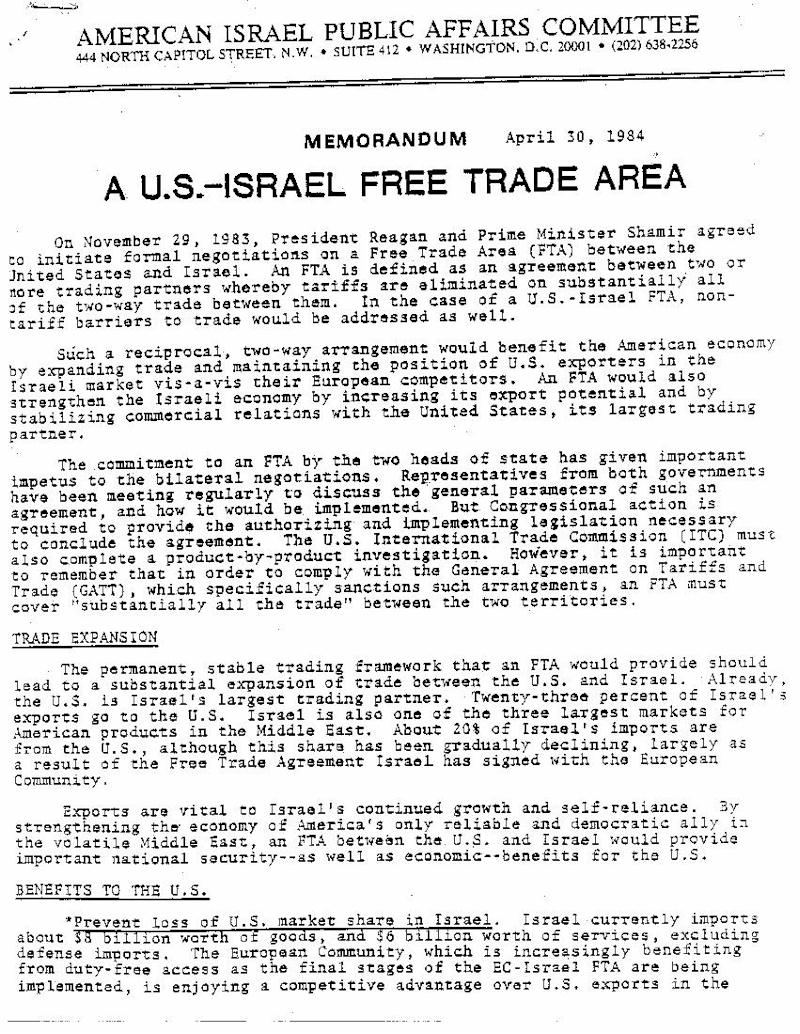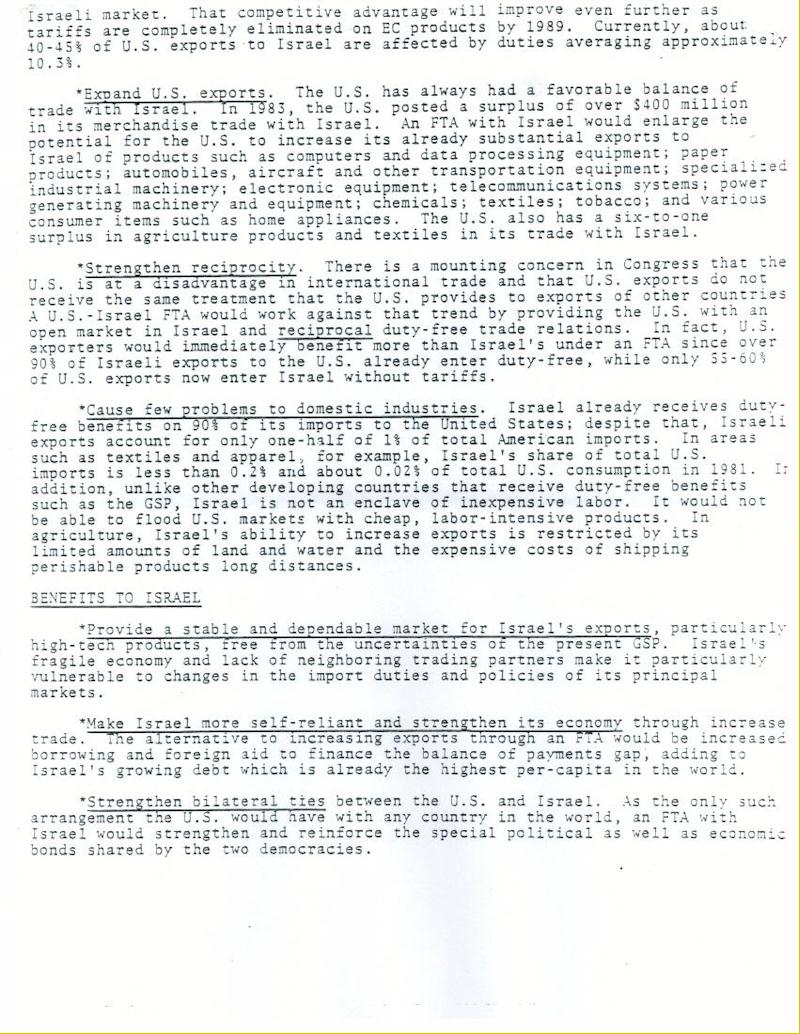|
|


back to
The US-Israel Free Trade Agreement
Text
Version
AMERICAN ISRAEL PUBLIC
AFFAIRS COMMITTEE
444 NORTH CAPITOL STREETí. NW ē SUITE 412 ē WASHINGTON. D.C. 20001 ē
(202) 638.2256
MEMORANDUM April 30, 1984
A U.S..-ISRAEL FREE TRADE AREA
On November 29, 1983, President Reagan and Prime Minister Shamir agreed
to initiate formal negotiations on a Free trade Area (FTA) between the
United States and Israel. An FTA is defined as an agreement between two
or more trading partners whereby tariffs are eliminated on substantially
all of the two-way trade between them. In the case of a U.S. -Israel FTA,
non-tariff barriers to trade would be addressed as well.
Such a reciprocal, two-way arrangement would benefit the American
economy by expanding trade and maintaining the position of U.S.
exporters in the Israeli market vis-a-vis their European competitors. An
FTA would also strengthen the Israeli economy by increasing its export
potential and by stabilizing commercial relations with the United
States, its largest trading partner.
The commitment to an FTA by the two heads of state has given important
impetus to the bilateral negotiations. Representatives from both
governments have been meeting regularly to discuss the general
parameters of such an agreement, and how it would be implemented. But
Congressional action is required to provide the authorizing and
implementing legislation necessary to conclude the agreement. The U.S.
International Trade Commission (ITC) must also complete a
product-by-product investigation. However, it is important to remember
that in order to comply with the General Agreement on tariffs and Trade
(GATT), which specifically sanctions such arrangements, an FTA must
cover "substantially all the tradeĒ between the two territories.
TRADE EXPANSION
The permanent, stable trading framework that an PTA would provide should
lead to a substantial expansion of trade between the U.S. and Israel.
Already, the U.S. is Israelís largest trading partner. Twenty-three
percent of Israelís exports go to the U.S. Israel is also one of
the three largest markets for American products in the Middle East.
About 20% of Israelís imports are from the U.S., although this share has
been gradually declining, largely as a result of the Free Trade
Agreement Israel has signed with the European Community.
Exports are vital to Israelís continued growth and self-reliance. By
strengthening the economy of America's only reliable and democratic ally
in the volatile Middle East, an FTA, between the, U.S. and Israel would
provide important national security--as well as economic--benefits for
the U.S.
BENEFITS TO THE U.S. -
*Prevent loss of U.S. market share in Israel. Israel currently
imports about $8 billion worth of goods, and $6 billion worth of
services excluding defense imports. The European Community, which is
increasingly benefiting from duty-free access as the final stages of the
EC-Israel FTA are being implemented, is enjoying a competitive advantage
over U.S. exports in the israeli market. That competitive advantage will
improve even further as tariffs are completely eliminated on EC products
by 1989. Currently, about 40-45% of U.S. exports to Israel are affected
by duties averaging approximatel)
10.3%. -
*Expand U.S. exports. The U.S. has always had a favorable balance
of trade with Israel. in 1983, the U.S. posted a surplus of over $400
million in its merchandise trade with Israel. An FTA with Israel would
enlarge the potential for the U.S. to increase its already substantial
exports to Israel of products such as computers and data processing
equipment; paper products; automobiles, aircraft and other
transportation equipment; specialized industrial machinery; electronic
equipment; telecommunications systems; power generating machinery and
equipment; chemicals; textiles; tobacco; and various consumer items such
as home appliances The U.S. also has a six-to-one surplus in agriculture
products and textiles in its trade with Israel.
*Strengthen reciprocity. There is a mounting concern in Congress
that the U.S. is at a disadvantage in international trade and that U.S.
exports do not receive the same treatment that the U.S. provides to
exports of other countries. A U.S.-Israel PTA would work
against that trend by providing the U.S. with an open market in Israel
and reciprocal duty-free trade relations. In fact, U.S. exporters
would immediately benefit more than Israel's under an FTA since over 90%
of Israeli exports to the U.S. already enter duty-free, while only
55-60% of U.S. exports now enter Israel without tariffs.
*Cause few problems to domestic industries. Israel already
receives duty free benefits on 90% of its imports to the United States;
despite that, Israeli exports account for only one-half of 1% of total
American imports. In areas such as textiles and apparel, for example,
Israelís share of total U.S. imports is less than 0.2% and about 0.02%
of total U.S. consumption in 198l. In addition, unlike other developing
countries that receive duty-free benefits such as the GSP, Israel is not
an enclave of inexpensive labor. It would not be able to flood U.S.
markets with cheap, labor-intensive products. In agriculture, Israelís
ability to increase exports is restricted by its limited amounts of land
and water and the expensive costs of shipping perishable products long
distances.
BENEFITS TO ISRAEL
*Provide a stable and dependable market for Israelís exports,
particulary high-tech products, free from the uncertainties at the
present GSP. Israel's fragile economy and lack of neighboring trading
partners flake it particularly vulnerable to changes in the import
duties and policies of its principal markets.
*Make Israel more self-reliant and strengthen its economy through
increase trade. The alternative to increasing exports through an FTA
would be increased borrowing and foreign aid to finance the balance of
payments gap; adding to Israelís growing debt which is already the
highest per-capita in the world.
*Strengthen bilateral ties between the U.S. and Israel, As the
only such arrangement the U.S. would have with any country in the world,
an FTA with Israel would strengthen and reinforce the special political
as well as economic bonds shared by the two democracies. |
|
